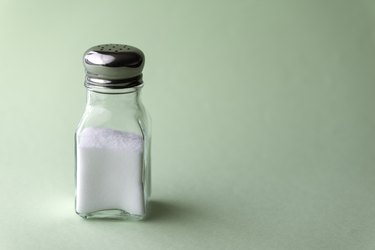
Iodine is a trace element found in some foods and fortified salts. According to the National Institutes of Health (NIH), it's an essential part of the thyroid hormones thyroxine and triiodothyronine, which regulate vital processes such as protein synthesis and the development of the skeletal system.
Iodine may also help the immune system, per the NIH.
Video of the Day
Video of the Day
Iodine and Iodide
As described by the NIH, iodine can take several chemical forms, including iodide. "Iodine rarely occurs as the element, but rather as a salt," researchers explain. "For this reason, it is referred to as iodide and not iodine."
Iodine Consumption, Digestion and Absorption
Iodine is important for thyroid function in human growth, development and reproduction. The U.S. Department of Agriculture's Agriculture Research Service notes it can be obtained by eating seaweed, fish and other seafood, dairy products, eggs, dietary supplements and iodized salt.
The amount of iodine in common food sources can vary greatly, depending on factors such as the amount of iodine in the soil where the plants were grown, how much iodine was in the animals' feed or the species of seaweed. Therefore, many countries have salt-iodization programs.
Iodide (read: iodine) is quickly and efficiently absorbed through the walls of the digestive tract in the stomach and duodenum, per the NIH. After it's absorbed, most of it concentrates in the thyroid gland.
Iodine in Salt
Salt producers in the U.S. have been adding iodine to table salt since the 1920s, according to a July 2021 report in the European Journal of Endocrinology, and 88 percent of households worldwide now use iodized salt — thereby helping to ensure adequate iodine consumption.
That said, the salt shaker is not the primary source of salt for people in the U.S., according to the NIH. Rather, the main source of salt is processed foods (such as canned soups or potato chips), and these are typically made without iodized salt, per the NIH. Also worth noting: kosher salt, fleur de sel and other specialty salts are non-iodized, according to the NIH.
The recommended dietary allowance for iodine is 150 micrograms per day for adults, per the NIH. People who are pregnant or breastfeeding need more, according to the NIH.
While the recommended daily intake of iodine for adults is 150 micrograms, the NIH notes that the so-called "tolerable upper limit" — the maximum safe dosage that's not likely to create negative effects on health — is far greater: 1,100 micrograms.
Safe Iodine Levels
Multivitamins and potassium iodide supplements can serve as reliable sources of iodine for those who need it. For example, iodine supplements are used to prevent goiter (which is an enlarged thyroid gland in the neck) and reduce the risk of thyroid cancer after radiation exposure.
Iodine deficiency during pregnancy may have a negative effect on fetal growth and development, possibly leading to brain and central nervous system damage. Low intakes of iodine can also cause hypothyroidism and goiter.
Iodine consumption may also influence gut health, according to June 2020 research in Nutrients.
Iodine supplements are available in a variety of forms — including liquid solution — but you should speak to your doctor before using an iodine supplement because toxicity is a concern.
Iodine Toxicity
Iodine might adversely interact with antithyroid drugs, lithium and warfarin, as noted by the Lima Memorial Health System in Ohio. In rare cases, overconsumption of iodine can lead to toxicity. High doses could potentially damage the thyroid gland and increase the risk of thyroid diseases. Excess iodine intake can temporarily reduce thyroid hormone synthesis and may even induce hyperthyroidism or hypothyroidism, according to the June 2020 research in Nutrients.
Moderate iodine toxicity is typically marked by elevated levels of thyroid stimulating hormone, or TSH, in the bloodstream. Moderate toxicity, which can occur at levels above the tolerable upper limit, may result in hypothyroidism, or insufficient production of thyroid hormones that regulate metabolism of food nutrients. Consumption of more than 1,700 micrograms of iodine per day may cause goiter, according to the Linus Pauling Institute at Oregon State University.
Acute iodine toxicity is rare, and typically occurs at dosages of more than 1 gram of iodine, according to the National Library of Medicine. It can create symptoms such as diarrhea, nausea and vomiting.
- National Institutes of Health: "Iodine — Fact Sheet for Health Professionals"
- Applied Microbiology and Biotechnology: "Different Host-Specific Responses in Thyroid Function and Gut Microbiota Modulation Between Diet-Induced Obese and Normal Mice Given the Same Dose of Iodine"
- Agricultural Research Service: "USDA, FDA and ODS-NIH Database for the Iodine Content of Common Foods"
- European Journal of Endocrinology: "Global perspectives in endocrinology: coverage of iodized salt programs and iodine status in 2020"
- National Library of Medicine: "Iodine Toxicity"
- Lima Memorial Health System: "Possible Interactions with Iodine"
- Linus Pauling Institute: "Micronutrient Information Center - Iodine"
- International Journal of Molecular Sciences: "Molecular Iodine Has Extrathyroidal Effects as an Antioxidant, Differentiator, and Immunomodulator"
- Nutrients: "Thyroid-Gut-Axis: How Does the Microbiota Influence Thyroid Function?"
Is this an emergency? If you are experiencing serious medical symptoms, please see the National Library of Medicine’s list of signs you need emergency medical attention or call 911.